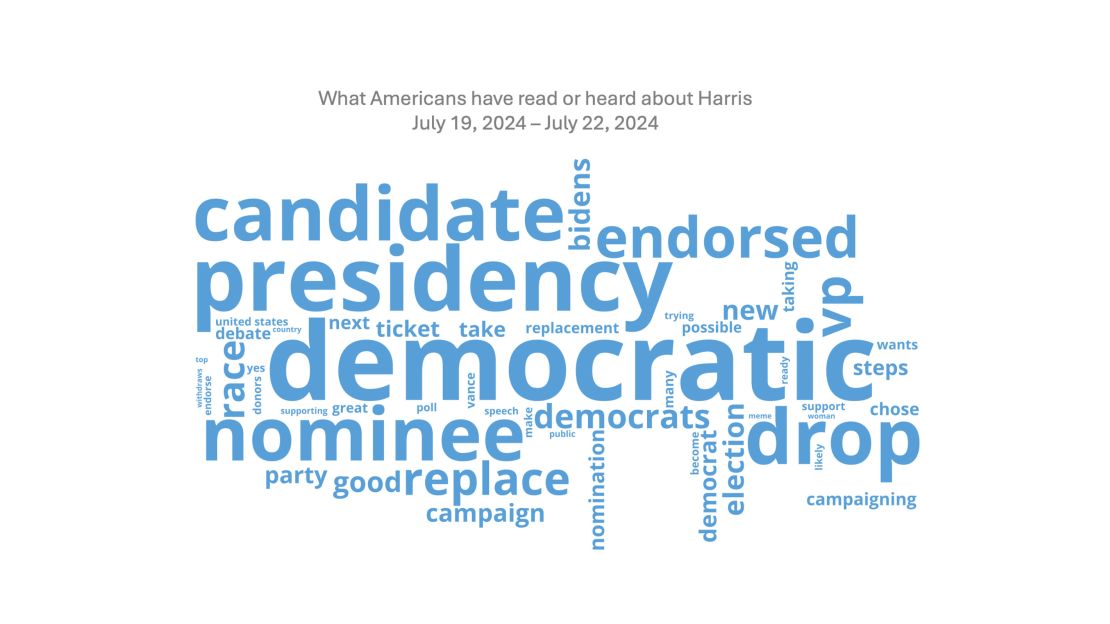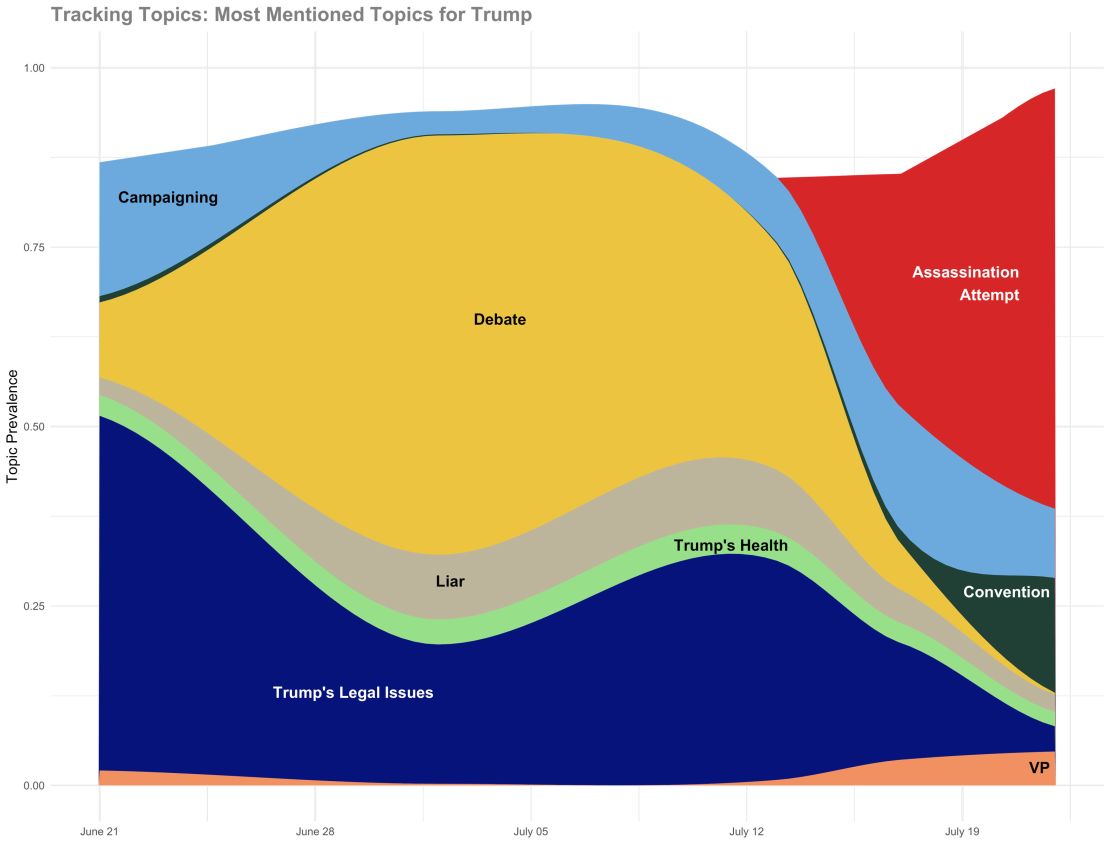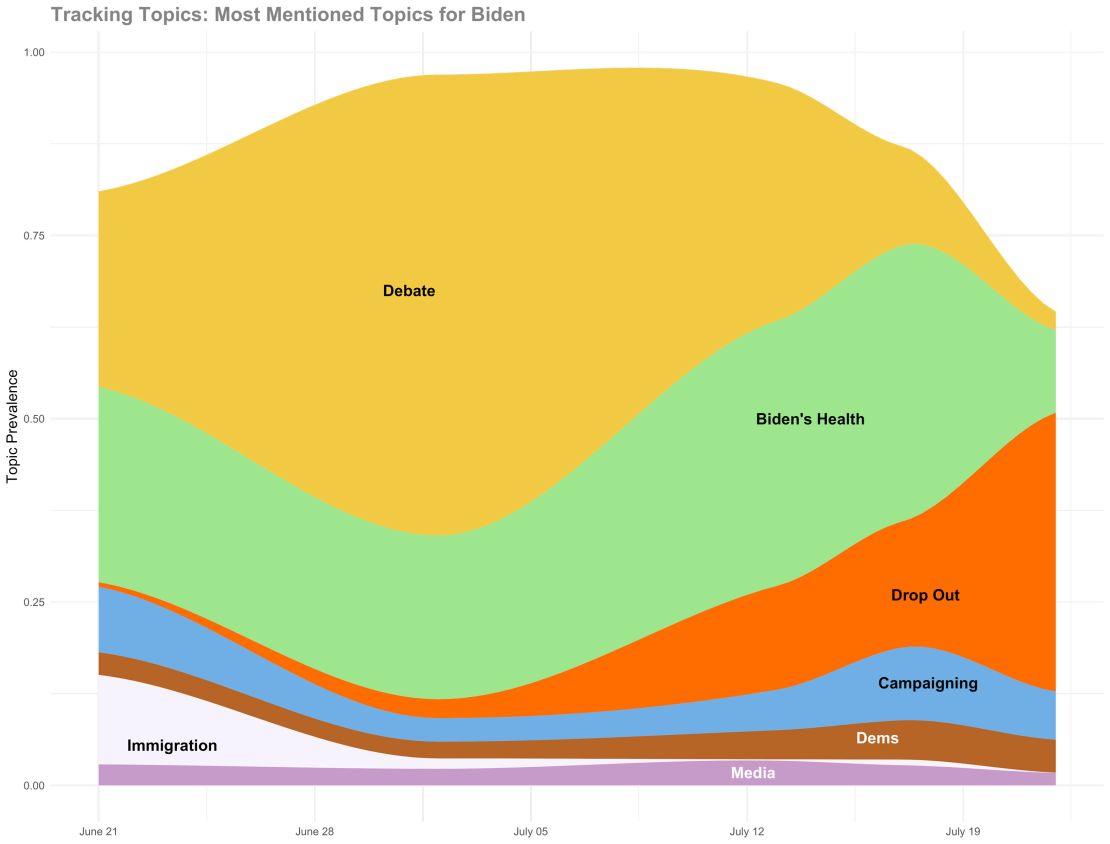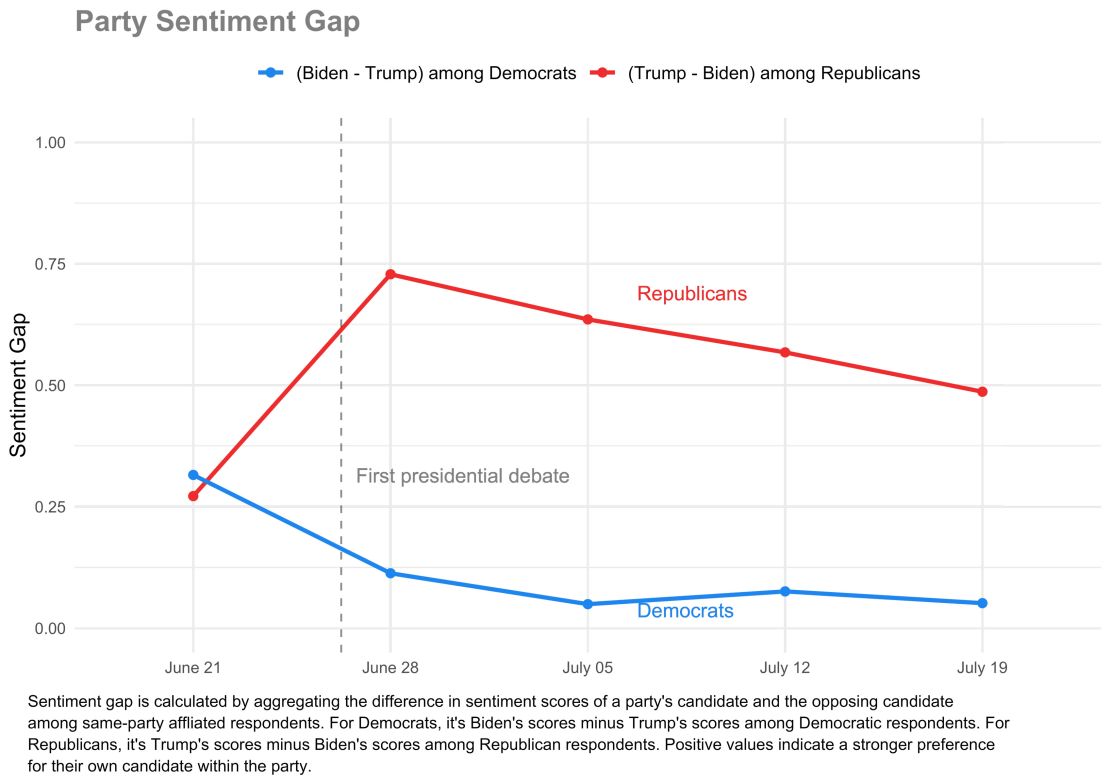Vice President Kamala Harris’ entrance into the race offers Democrats the possibility of a major campaign reset heading into this year’s Democratic convention – and as she made her campaign debut, the survey suggests Americans are far more focused on the change in the ticket than about her or her policies, leaving a lot of space to define her in voters’ minds.
The survey, conducted by SSRS and Verasight on behalf of a research team from CNN, Georgetown University and the University of Michigan, asks Americans what they have heard, read or seen about presidential candidates each week from Friday through Monday. In initial data from late June and through July, about 8 in 10 Americans said each week that they’d read or heard at least something about Biden or Trump, respectively. That’s higher than the share who were following the candidates at this time four years ago. The roughly comparable levels of attention to Biden and Trump also marks a shift from 2020, when Trump – then the incumbent – attracted more attention than Biden throughout most of the campaign.
Harris, meanwhile, is just beginning to face the full force of the national spotlight as the presumptive Democratic nominee. In the two days before Biden dropped out, only about half (53%) of Americans said they’d recently heard anything about her; afterwards, that surged immediately to about two-thirds (68%). The conversation, however, rarely got beyond the news of those days, with many Americans simply noting the start of her candidacy, as well as the flood of endorsements she received from other Democratic politicians.

In late June, prior to the debate, the stories taking up the most oxygen around the Trump campaign revolved largely around his legal issues, with significant shares of the public noting the recent felony convictions against him – five of the top seven words used by respondents referenced his conviction in the first week of the poll. In late June, the Supreme Court ruling that Trump is entitled to some immunity from prosecution also drew some notice, with “Supreme Court” by far the top two-word pair used in describing what Americans had heard about Trump that week. But the focus had shifted away from his criminal conviction: first to his debate against Biden, and then to the assassination attempt against him. By contrast, two more standard campaign milestones – the Republican National Convention and Trump’s selection of a running mate – drew less public attention.

Discussion of possible Trump policies were also relatively muted, but the poll also found some mentions of Project 2025, a conservative playbook for the next Republican president published by the Heritage Foundation, that many Demodcrats have sought to emphasize. Project 2025 rose to be the second most frequently mentioned two-word phrase by the fourth week of the survey, though it slipped in frequency in the most recent week amid news of the assassination attempt and RNC. With Trump now squaring off against a new Democratic rival, there’s different aspects of his candidacy that could gain attention in the campaign’s remaining months.
The data around Biden charts the unrelenting negativity that characterized the end of his campaign. For weeks following the debate, his performance onstage remained the dominant topic surrounding the president – with “debate” one of the top two words used to describe what Americans had heard about the president in each week of the poll until it was replaced by “drop” and “Covid” in the most recent week. Broader questions about his health also rose to the top of Americans’ minds (by the fourth week of the project, 46% of those who heard, read or saw anything about Biden referred to his health), and then the increasing calls for him to exit the race. Six of the 10 most frequently used two-word phrases in the week before Biden ended his campaign included the word “drop.” Other topics, such as the Biden administration’s executive actions on immigration earlier in June, largely disappeared from the conversation.

The survey also asked about Robert F. Kennedy, Jr., who is mounting an independent bid for president, with 6 in 10 or more in each week reporting that they had heard nothing about him in recent days.
The Breakthrough survey project will run throughout the 2024 campaign, tracking the things Americans say they read, hear and see about the candidates.
The results provide a different lens on the campaign than much other election polling, demonstrating which current events, campaign narratives and media stories break through to the American public amid a perennially busy news environment. In past elections, the responses to that question highlighted overarching campaign dynamics, ranging from the looming presence of the coronavirus pandemic during the 2020 campaign, to the way mentions of Hillary Clinton’s email server dominated conversations throughout her 2016 campaign.
As part of the Breakthrough project, researchers also analyzed the tone of responses, measuring “sentiment scores,” or whether people used more positive or negative words in describing what they heard about presidential candidate. They also compared how Democrats’ and Republicans’ sentiments about their own party’s candidate compared to what they were hearing about the opposing party’s candidate.
Looking at the trend over time shows a sharp divergence between the conversations around Trump and Biden following the presidential debate. Prior to that, Republicans and Democrats alike offered slightly more positive impressions about the news surrounding their own party’s candidate than the rival candidate. But afterwards, Republicans’ sentiment scores showed that they were far more positive about Trump than about Biden.

At the same time, Democrats’ relative sentiments about Biden slumped – meaning that what they reported hearing about the president was only slightly more positive than what they reported hearing about Trump. Biden’s in-party numbers on this metric never recovered before his exit from the race.
Read more about the Breakthrough here.